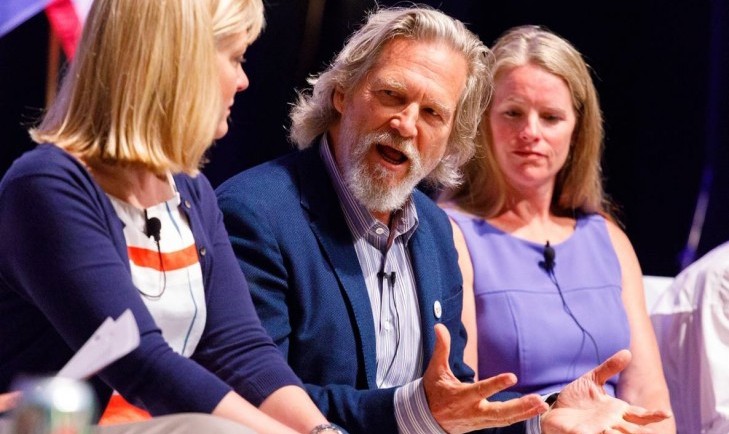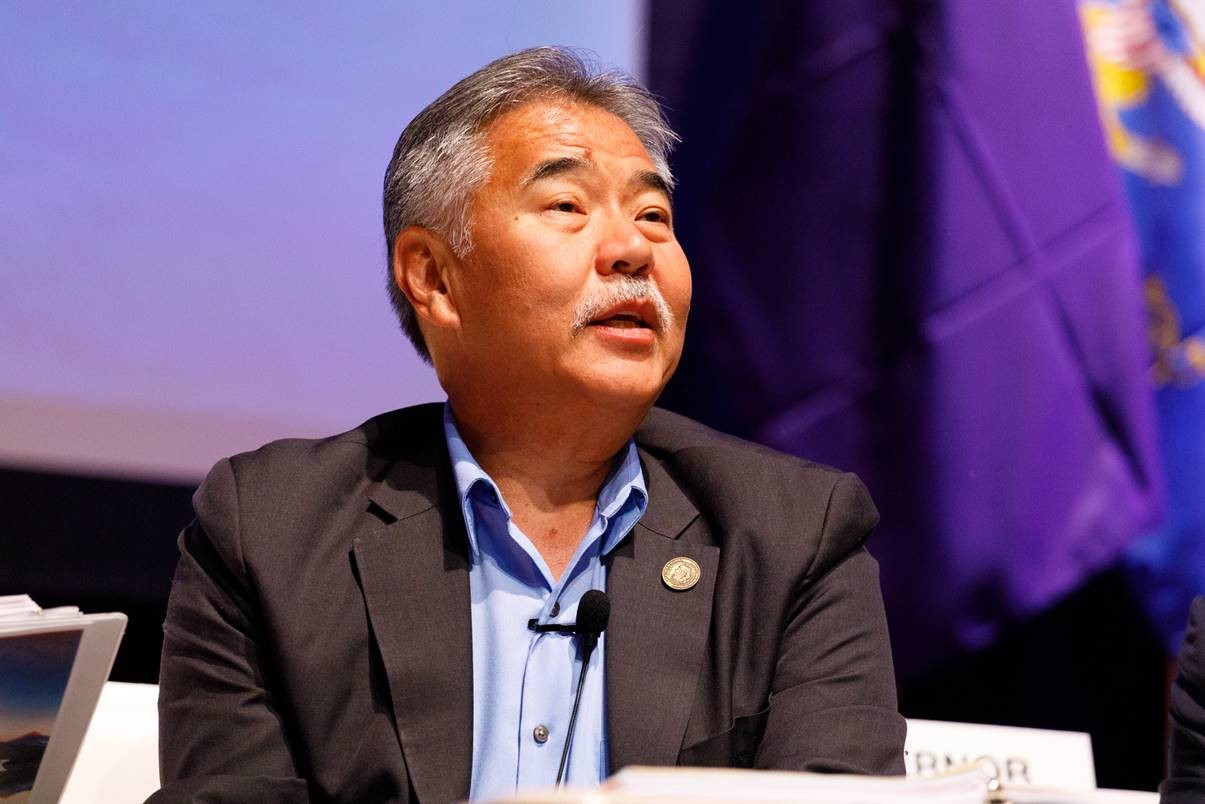
Western Governors brought the 2017 Annual Meeting to a stirring conclusion with an emotional conversation about ending childhood hunger featuring actor Jeff Bridges, a frank discussion about the infrastructure investment required in the West, and Gov. Dennis Daugaard's announcement of his Chairman’s Initiative on workforce development.
Ten Western Governors took part in the three-day meeting hosted by WGA Chair and Montana Gov. Steve Bullock, including WGA Vice Chair Dennis Daugaard (South Dakota), John Hickenlooper (Colorado), David Ige (Hawaii), Butch Otter (Idaho), Brian Sandoval (Nevada), Doug Burgum (North Dakota), Ralph Torres (Northern Mariana Islands), Gary Herbert (Utah), and Matt Mead (Wyoming).
Roundtable: No Kid Hungry featuring Jeff Bridges: The Governors were joined by First Lady Lisa Bullock and Academy Award-winning actor Jeff Bridges (shown above) in a roundtable discussion about childhood hunger. Bridges, the spokesman for No Kid Hungry, has been active in this arena for more than three decades. (Listen to the roundtable)
Bridges: “The enormity of the problem is what drew me in to working on it: 1 in 5 kids in Montana and 1 in 6 across the nation are suffering from hunger. For Native Americans, it is 1 in 3. This is shocking, but it is such a solvable problem. In this nation, we have the money, the food and the know-how. We just need the will to get it done. I’m excited to be here today. Think of the team we have assembled on this stage. We can get stuff done to solve this!”
(On the origin of No Kid Hungry) “Rather than going to the federal government to get money, which wasn’t getting the results I wanted, this campaign is focused on action by Governors in their states. Governors are perfect leaders for this issue: They are hands-on and  look out for their people. Governor (Steve) Bullock and (Brian) Sandoval, Jerry Brown in California, all have engaged and we have started to see wonderful results in the last seven years.”
look out for their people. Governor (Steve) Bullock and (Brian) Sandoval, Jerry Brown in California, all have engaged and we have started to see wonderful results in the last seven years.”
First Lady Bullock: “Many children leave school for the day and they know they won’t eat until they come back to school the next day. Through the Backpack Program (in Montana), when the kids go out to the playground in the afternoon, someone – the kids call them Food Fairies – put snack packs in the backpacks of kids in need. It’s a wonderful program that gives them a sense of security that there will be food at home.”
Gov. Torres: “I had a very personal experience when I met a homeless family and asked if I could have dinner with them. We went to the McDonalds and the children begged their parent to be able to eat. It broke my heart. I would like to dedicate himself to getting the islands into the program. They have resources, but don’t know how to go about it.”
Gov. Ige: “The First lady is a teacher and can see how hunger changes behavior in the children. She has been asking and trying to figure out summer food programs.”
Gov. Sandoval: “After meeting with Jeff, we made a commitment to sponsor a bill … schools with 70% school lunch eligibility are required to serve breakfast. We got a lot of pushback from education and school communities. Along with it we provided a $2 million appropriation for grants through the State Department of Agriculture to allow schools to seek funds to hire people, get supplies, and the like. Out of 111 schools eligible, 109 took advantage and we have served 3 million-plus meals.”
Western Governors’ Conversation on Infrastructure: The Governors, in a discussion moderated by Hawaii Gov. David Ige, talked about the significance of infrastructure investment in the West.
 Gov. Ige: “Airports and harbors are our lifelines in Hawaii; 98 percent of consumer goods in Hawaii enter the state through 10 ports. The visitor industry is the number one industry in Hawaii. We need to make investments in our airports because Hawaii is the crossroads of the Pacific.”
Gov. Ige: “Airports and harbors are our lifelines in Hawaii; 98 percent of consumer goods in Hawaii enter the state through 10 ports. The visitor industry is the number one industry in Hawaii. We need to make investments in our airports because Hawaii is the crossroads of the Pacific.”
Gov. Otter: “Stimulus packages have always addressed new projects but our problem isn’t new projects, our problem is maintenance … I would like to see a stimulus package that supports using money for old infrastructure. We need to take care of what we already have.”
Gov. Daugaard: “The conversation at the federal level is public-private partnerships, but those don’t work in a rural state like South Dakota, which doesn’t have the population or traffic to support those partnerships.”
Gov. Bullock: “The federal government should look at the electric grid as part of the conversation on infrastructure … Private-public partnerships sound great, but they should not supplant the funding for states to improve our highways.”
Gov. Herbert: “The problem is the lack of streamlining in the Environmental Impact Statement process. It will save a lot of money and efficiency if we streamline permitting.”
Gov. Mead: “When you travel to other countries, you realize that the United States is falling behind regarding surface transportation. I don’t think we could build an interstate highway system today with all of the permitting delays, which is a sad statement.”
Gov. Burgum: “A lot of the infrastructure planning at the federal level did not take into consideration technological advances … If we’re going to spend federal dollars in our state, the metric should be how it increases the tax base.”
Year 2 Update: Species Conversation and ESA Initiative: Over the past two years Western Governors, through WGA, have been leading a big-tent regional discussion focused on identifying ways to improve the implementation and efficacy of the Endangered Species Act to make it work better for species. In this session, the Governors announced an amendment to the 2016 resolution, Species Conservation and the Endangered Species Act, that incorporates by reference a number of Recommendations informed by extensive outreach to a broad and bipartisan coalition of stakeholders. Read the Recommendations and the Resolution.
Incoming Chair’s Remarks: Outgoing Chair, Montana Gov. Steve Bullock, kicked off the session with remarks that highlighted the work of the Western Governors. He also introduced the new Vice Chair, Hawaii Gov. David Ige, and new Chair, South Dakota Gov. Dennis Daugaard.
Gov. Bullock: “I’ll never forget going to my coworkers and saying I’m getting into the leadership of WGA, and they said ‘You’re going to face some of the most contentious issues while you’re running for governor?’”
 “But the Governors have the ability to take on issues – difficult, difficult issues – by coming together, working together, having one another’s back.”
“But the Governors have the ability to take on issues – difficult, difficult issues – by coming together, working together, having one another’s back.”
“I have no doubt that each one of the governors active in WGA have gotten grief for being willing to work together. But I also know that its critical for our state and for our nation and our political system.”
Gov. Ige: “I look forward to my time as Vice Chair … because the country needs to have that inspiration on bipartisanship and focus on issues that matter to each of our communities.”
“So many issues we have in our independent states are connected. We face the same challenges, whether we are in Wyoming, Montana or Hawaii.”
Gov. Daugaard: “When I was young, our fathers would choose a career and stay in that same career their whole life. Today it is a vastly different world. The demands on our workers are changing so rapidly that it’s hard for our workers to be ready to work when a job is available, and hard for them to keep pace with change at work.”
“I see our young people embarking on academic pathways that lead to lots of debt and years of training and at the end of the road they have no job opportunities. They are confounded and confused and feel betrayed. They were led to believe that if they worked hard for four years they would find success.”
“So many of our young people are not aware of where the demand is or don’t know how to get there if they are aware … We have to adapt our education and training institutions to realign with today’s jobs.”
“That’s why I have chosen the Western Governors’ Workforce Development Initiative as my Chairman’s Initiative for the year to come. I’m not proposing a one-size-fits-all approach; we all have different needs and might have different approaches. We can all learn from each other.
“The first of a series of regional workshop for the initiative will be held on August 3-4, 2017 in Sioux Falls, South Dakota.
Read about Day 1 of the Meeting
Read about Day 2 of the Meeting
Read, download new WGA Resolutions
Get more news about the West and its governors by following the Western Governors' Association on Twitter, Facebook and LinkedIn.